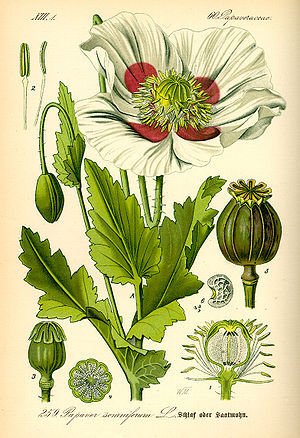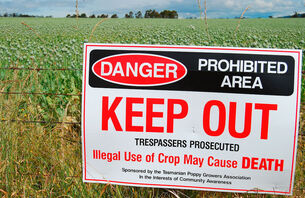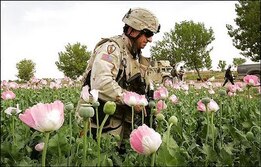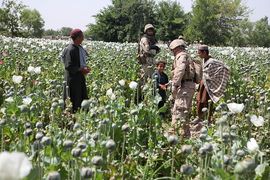Opium Poppy, Breadseed Poppy; Papaver somniferum
Growing Winter Flowers:
Some plants are winter plants and only grow in cold weather or in winter. These varieties include California poppies, opium poppies and hemlock. The biggest mistake some people make is to think that every plant grows like corn and tomatoes. Not winter flowers. Opium poppies need a period of cold before sprouting, with continued cold needed for best growth. Some suggest putting poppy seeds in a cold refrigerator for a month. If you live in a cold climate, that is not necessary. I have never cold stratified my poppy seeds and they grew just fine, but maybe even finer with cold stratification...?
In some countries like Afghanistan, poppies are planted in September and they grow through the rainy, cold winter. In the USA, they seem to prefer to be sown in March. They like and need cold winter weather. Frost is fine, and so is snow.
I have planted poppies in California in September, and they still did not sprout until March. But we rarely have frost here, even in winter. Minimum germination temperature is 60F or LOWER, down to about 30F. They may not sprout at all above 60F.
They do best when the highest daily temperature is below 60F.
If you try sprouting in an area above that minimum temp, cold stratify in the fridge for a month then plant on the coldest day of the year. They wither and die in hot weather. Not really suitable to grow outdoors in Hawaii or Florida. Indoors with AC might work.
How to Grow somniferum Poppies:
- Rake cold, fertile garden soil, then by hand, throw the seeds onto the ground. You can gently tamp down, or just leave. They are vulnerable to some birds, and young sprouts may be eaten by slugs or sow bugs.
- The plants need about a square foot of rich soil per plant. Richer soil means bigger plants.
- Full sun.
- From sprout to flowers takes six to eight weeks. Once established, they are indestructible and only need water once a day at most. You can add a bloom formula fertilizer as flowers take form, such as 0-0-12 or 1-6-12.
How to Keep it Legal:
Please note that under Federal law, Schedule 2, it specifically bans the dried stems and pods, or 'poppy straw,' as drugs, but not the flowers or the seeds. Flowers are short lived and last at most only two days. Very attractive to bees and other pollinators. Many people I know grow the poppies just for their extremely pretty flowers and then just compost the entire plant.
Some gardeners will deadhead the flowers once the petals drop off to stay legal. Doing so may result in a white juice seeping up from the cut, which contains alkaloids and is medicinal. Scoring pods is illegal and advertises to your local police that you are illegally harvesting drugs, so don't do that.
The seed conundrum, or Catch 22, is that viable, nutritious breadseed can only be harvested from the illegal mature pods. Hence nearly all poppy seeds sold in the US come from other countries, such as the UK or New Zealand or India or the EU. Most western, and eastern, countries allow growing the poppy plant, but not cutting or scoring of the pods for drugs. Which is very reasonable.
Historical Background:
Most poppy varieties are grown for their pain killing alkaloids and are known as opium poppies. Some varieties have been grown for their culinary properties, such as Slovakian Ziar or Hungarian Breadseed, and have fewer bitter alkaloids and more seeds and are truly for culinary bread seed uses. Some have been grown for their unique flower colors, such as Danish Flag. Others, such as Hens and Chicks, grow unusual pods that make showy, although illegal, floral displays. Others are grown for making huge pods, such as the Giant or Giganteum. The bigger the pod, the more likely to contain more alkaloids. Tasmanian varieties from down under are typically grown for their opium content to be used in the US pharmaceutical industry. Big Pharma cannot grow them here.
In Afghanistan, the opium fields are turned into illegal heroin. Now, synthetic fentanyl is 50 to 100 times stronger than heroin and is so deadly it is killing Americans by the hundred thousand each year and is extremely dangerous to even breath in the dust. The leading cause of death for 18 to 49 year old Americans is all forms of opiates, legal or illegal. The leading cause of death for American children under 18 is guns. Guns and drugs are killing Americans. But NOT poppy plants.
In the old days, people like Thomas Jefferson grew opium poppies at their farms every year. Jefferson even had his own opium poppy strain that he grew year after year and was once sold in the on-site gift shop.
The pods are typically harvested once the first holes open in the tops. The pods are put upside down over or inside glass to allow gravity to extract the seeds as they dry. Sometimes they may be broken open to scrape out any remaining seeds. The seeds and pods are then stored separately, with the pods going into the medicine cabinet in glass, and the seeds going into the garden shed or the kitchen pantry to be used for food or for growing flowers next season, or both. People soon learned that one average pod steeped into a hot medicinal tea would make two doses.
White poppy seeds from India are typically washed of alkaloids before going into the culinary market, and may not therefore be viable or sproutable.
The US government does not like seed companies or grocery stores to use the word 'opium' as a seed descriptive, so nearly all seeds in retail are supposed to be called 'bread seed' even though they may actually be opium poppy seeds instead.
The term 'narcotic' traditionally refers to the extracts of this plant, such as opium, morphine, heroin, etc.
Cultural References:
Humans have been using opium poppies as medicine for over 10,000 years that we know of, and perhaps as far back as 50,000 years. That is much longer than the lifespan of the Food and Drug Administration or the Nixonian Federal DEA. They even appear in US films. In the Wizard of Oz, the poppy fields that put Dorothy to sleep were originally opium poppies in the book. In HBO's hit TV show Game of Thrones, they often referred to the "Juice of the Poppy" as a remedy for pain, such as painful burns from a live dragon or cuts from a common sword fight.
SEE also my Poppy category page.
Reality Check:
Rarely are opium poppies lethal in their natural form. People learned over time that one average pod steeped into a hot medicinal tea would make two doses of what is now in a pill at our modern pharmacies. However, lethal drug overdose is still possible; the poppy plants or plant parts kill about one American per decade, which is crazy safe for any common activity such as breathing or eating. Even aspirin kills more people than that per year. So does drinking too much water, or caffeine, or peanuts, or driving. We consider cars as 'safe' even though we lose almost a half million Americans each decade due to car accidents. The actual poppy numbers do not at all support banning such a plant when the overall lethality is so super low compared to everyday living.
- Plants are not drugs.
- No plant should be illegal. God made a mistake? I don't think so.





